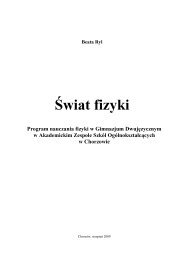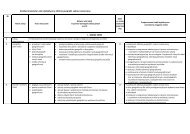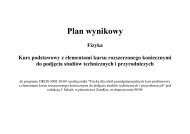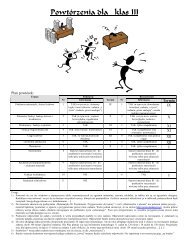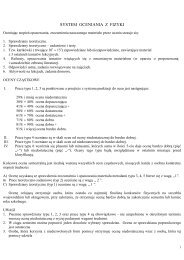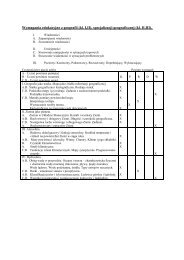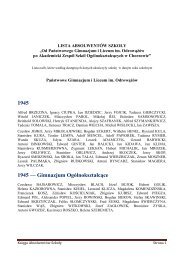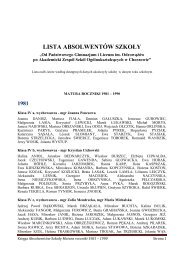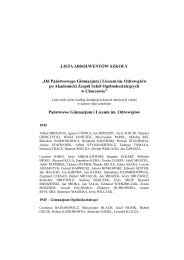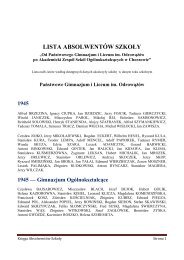Pearson Education Polska Sp. z o.o. ul. Jana Olbrachta ... - J.angielski
Pearson Education Polska Sp. z o.o. ul. Jana Olbrachta ... - J.angielski
Pearson Education Polska Sp. z o.o. ul. Jana Olbrachta ... - J.angielski
- No tags were found...
Create successful ePaper yourself
Turn your PDF publications into a flip-book with our unique Google optimized e-Paper software.
c/ Konstrukcje zdaniowe• Zdania złoŜone zawierające zdaniaprzydawkowe typu ‘defining’ :- z zaimkiem względnym who, that, which,where: The coach is a person who trainsthe players., A lion is an animal which livesin Africa., A toy is an object that children playwith., It’s near the place where I live.- bezzaimkowe: I like the book you gave me.• Zdania złoŜone zawierające zdaniaprzydawkowe typu “non-defining”:We visited the old castle, which was built in the 13 thcentury. The girl, to whom you phoned on Friday,has sent you a letter. The Tatra Mountains, whereyou can practise climbing,are worth visiting.• Zdania w mowie zaleŜnej:- zdania rozkazujące: He wanted me to go.,I told her not to hurry.- zdania pytające: She asked if I liked sciencefiction., He asked what her name was.- zdania oznajmujące: He said he was missingme.• Zdania typu echo question: I live in Warsaw.- Do you?, I am from Rome. – Are you?• Zdania zawierające Question Tags: You are John,aren’t you?, She comes from Italy, doesn’t she?,He was ... , wasn’t he?• Zdania złoŜone zawierające zdanieokolicznikowe przyczyny i skutku: It was cold,so we didn’t go for a walk., We didn’t go fora walk beacause it was cold.• Zdania w stronie biernej: Dinner is servedat 7 p.m., The house was built in 1935.• Zdania złoŜone zawierające zdania warunkowe:- I okres warunkowy: If you don’t eat yoursoup now it will get cold., I’ll be at schoolat 8 a.m. unless I miss my bus.- II okres warunkowy: If I had more moneyI’d go to Paris this summer.• Konstrukcja used + to + bezokolicznik:He used to read a newspaper before breakfast.• Zdania z operatorem shall:Shall I open the window?• Zdania z operatorem ought to:We ought to take him to the hospital.• Konstrukcja wo<strong>ul</strong>d like + dopełnienie + to +bezokolicznik: Wo<strong>ul</strong>d you like me to come?• Konstrukcja wo<strong>ul</strong>d you mind + gerund:Wo<strong>ul</strong>d you mind moving your car?• Zdania z operatorem may / might:He may not / might not come.d/ Zakres materiału gramatycznegoCzasyczasy: Simple Present, Present Continuous, SimplePast, Past Continuous, Future Simple, PresentPerfect w rozszerzonym zakresiezdania w Present Perfect- z okolicznikami czasu since i for:I haven’t seen him for ages., I haven’t seen himsince he left school.zdania w Simple Past- z okolicznikami czasu: two days ago,two weeks later, the next day, the day before,I met him again two weeks later., He arrivedthe day before my birthday.zdania wyraŜające przyszłość:- zamiar: I’m going to see him tonight.- decyzja: I will see him tonight.- ustalony plan: I’m seeing him tonight.czas Present Perfect Continuous określający:- czynność trwającą nieprzerwanie od jakiegośmomentu do chwili obecnej: He’s beensleeping for 14 hours., I’ve been waiting forher since 4 o’clock.czas Past Perfect określający:- czynność wcześniejszą od innej czynnościprzeszłej: When he had arrived at the airporthe phoned for a taxi.• Zdania z operatorem may / might wyraŜająceprzypuszczenie: We may come on Sunday.,She might / might not have problems at home.• Zdania z operatorem ought to / oughtn’t towyraŜające radę, powinność: You ought to spendmore time reading books.• Określniki- a couple of: a couple of minutes- a few: a few books- several: several days- hundreds / thousands of : hundreds of people• Rzeczownik- tworzenie rzeczownika od:czasownika + -ing : write – writingczasownika + -er, -or, -ance, -ion, -ment:run – runner, act – actor, act – action,perform – performanceprzymiotnika + -ness, -sy :happy – happiness, jealous – jealousy• Przedimek- przedimek nieokreślony, określony, zerowy(brak przedimka)• Zaimek- osobowy: someone, smebody, something,anybody, anything, anyone, nobody, nothing- miejsca: somewhere, anywhere, nowhereKomentarz:Komentarz:16



